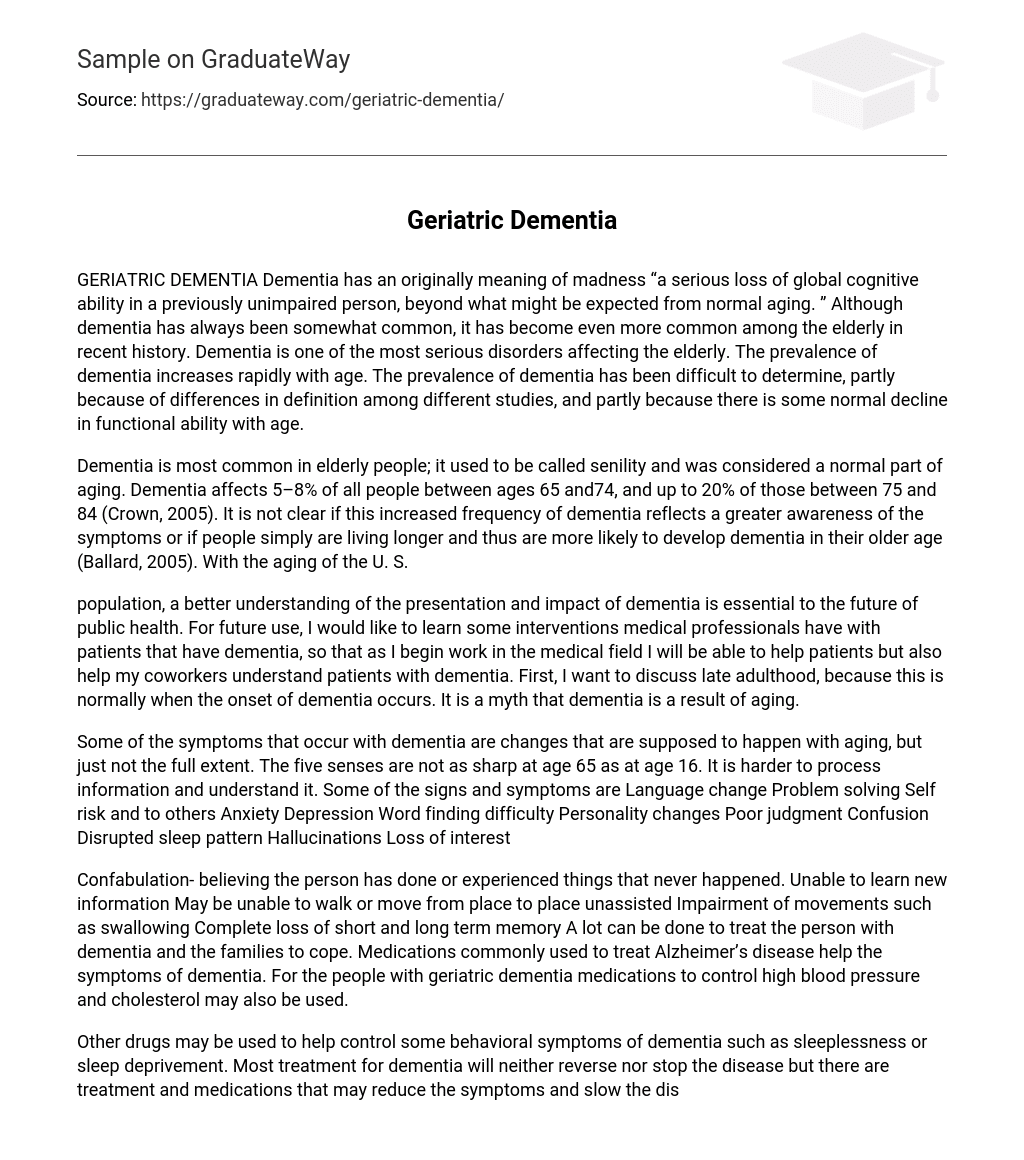Dementia originally meant madness, which is defined as a serious loss of global cognitive ability in a previously unimpaired person, beyond what might be expected from normal aging.” While dementia has always been somewhat common, it has become even more prevalent among the elderly in recent history. It is one of the most serious disorders affecting the elderly and its prevalence increases rapidly with age. Determining its prevalence has been difficult due to differences in definition among studies and because there is some normal decline in functional ability with age.
Dementia is most common in elderly people. It used to be called senility and was considered a normal part of aging. According to Crown (2005), dementia affects 5-8% of all people between the ages of 65 and 74, and up to 20% of those between the ages of 75 and 84. It is not clear if this increased frequency of dementia reflects a greater awareness of the symptoms or if people are simply living longer and thus more likely to develop dementia in their older age (Ballard, 2005). With the aging population in the U.S., it is important to continue researching ways to prevent or treat dementia.
Population growth highlights the importance of understanding the presentation and impact of dementia for the future of public health. As I embark on my medical career, I aim to learn interventions that medical professionals use with patients who have dementia. This knowledge will enable me to assist patients and educate my colleagues about dementia. Firstly, it is essential to discuss late adulthood because this is when the onset of dementia typically occurs. It is a common misconception that aging causes dementia.
Some of the symptoms that occur with dementia are changes that are expected to happen with aging, but not to the same extent. As we age, our five senses become less sharp than they were at age 16. It also becomes harder to process and understand information. Some signs and symptoms of dementia include changes in language, difficulty with problem-solving, increased self-risk and risk to others, anxiety, depression, difficulty finding words, personality changes, poor judgment, confusion, disrupted sleep patterns, hallucinations and loss of interest.
Confabulation is a symptom of dementia, which involves believing that a person has done or experienced things that never happened. Dementia also causes an inability to learn new information and may result in the inability to walk or move from place to place unassisted. Impairment of movements such as swallowing and complete loss of short and long-term memory are also common symptoms.
Fortunately, there are many treatments available for people with dementia and their families to cope with this condition. Medications commonly used to treat Alzheimer’s disease can help manage the symptoms of dementia. Additionally, medications used to control high blood pressure and cholesterol may be prescribed for people with geriatric dementia.
Other drugs may be used to help control some behavioral symptoms of dementia, such as sleeplessness or sleep deprivation. Most treatments for dementia will neither reverse nor stop the disease, but there are treatments and medications that may reduce symptoms and slow disease progression. When you are with a person dealing with this disease, you should be aware that they may not know all the things they say to you. Therefore, you should be sensitive to their feelings and not get offended if they say or do mean things.
Geriatric dementia can be challenging for both the person affected and their family. It’s a new experience for everyone involved, and they may struggle with the idea of being dependent on someone else to take care of them. The most difficult part for families is often when the person begins to experience short-term memory loss. They may ask the same question repeatedly, which can be frustrating and confusing for loved ones.
As dementia progresses, individuals typically require constant supervision to prevent harm to themselves or others. This level of care can be overwhelming for families, who may need outside assistance or support in managing their loved one’s needs.
Individuals with dementia may require assistance with daily activities such as eating, bathing, and dressing. Caregivers must exercise patience, understanding, and careful thought to meet these needs. The emotional and physical burden of caring for someone with dementia can be overwhelming. Support groups can provide caregivers with helpful information about the disease and its treatment while also offering a platform to deal with the demands of caregiving. It is essential that caregivers take occasional breaks from round-the-clock nursing demands.
Some communities offer adult day care centers or facilities that can provide care for dementia patients, allowing primary caregivers to take a break. However, many patients with dementia eventually require full-time nursing home services. Research has identified several factors that may prevent or delay the onset of dementia in some individuals. For instance, studies indicate that people who maintain tight control over their glucose levels tend to perform better on cognitive function tests than those with poorly controlled diabetes.
Several studies have suggested that engaging in intellectually stimulating activities, such as social interactions, playing chess or a musical instrument, and solving crossword puzzles can significantly lower the risk of developing Alzheimer’s disease (AD) and other forms of dementia. Scientists believe that these mental activities stimulate the brain in a way that increases a person’s cognitive reserve” – their ability to cope with or compensate for the pathological changes associated with dementia.
Geriatric dementia is a growing disease and should be taken very seriously. Learning to deal with the disease and recognizing the signs and symptoms can help both the person with it and their family. Taking prescribed medications can also slow down its progression, although there is no cure. When you have a family member with this disease, it’s okay to take a break by entrusting them in the care of adult daycares without feeling guilty.





